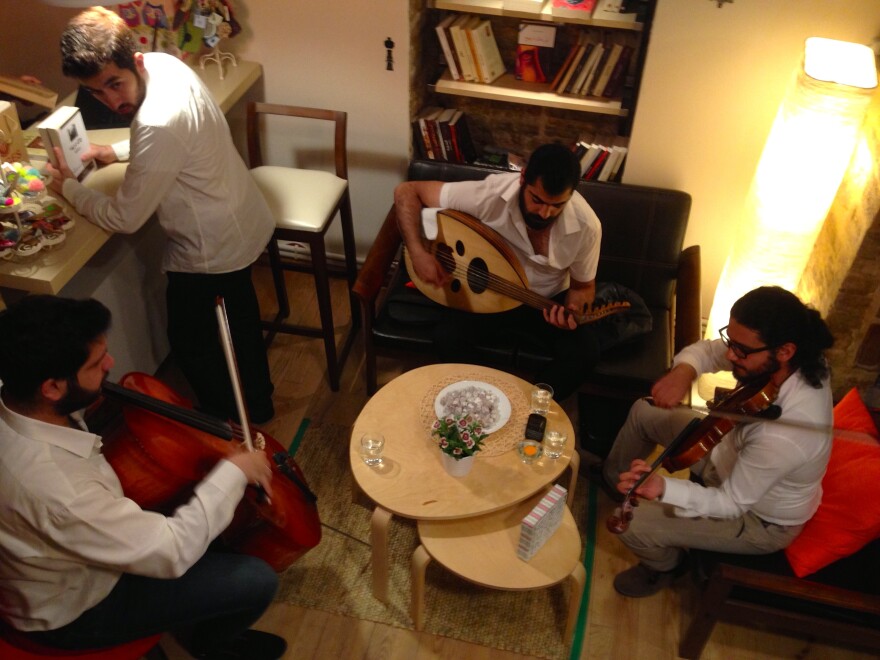After four years of war, Syrians are everywhere in Istanbul — on street corners, squatting in abandoned buildings. But a new venture run by Syrian and Turkish book lovers aims to be a cultural oasis for Arabic readers, and, along the way, give Turks a fuller picture of the Syrians, Iraqis and Libyans increasingly filling the city.
In a painstakingly restored old wooden house in a working class neighborhood, Syrians, Iraqis and Turks mingled recently amid the shelves of the Pages bookstore.

A Syrian string trio played in the corner, as browsers flipped through volumes in Arabic, Turkish, English and French. One teenager brings his choice — an Arabic translation of George Orwell's 1984— over to his headscarf-wearing mother. She looks at it, nods and puts it on the pile to purchase.
Partner and manager Samer al-Kadri has lived here for over a year now, after Bright Fingers Publishing — the company he co-founded in Damascus, Syria — became impossible to run because of the war.
When he got here he noticed right away the booming population of Syrians, Iraqis, Libyans and other Arabs, and saw a gaping need for an Arabic bookstore.
"There is a huge Arab community here, and there is no Arabic book," he says. "And this is our job."

Upstairs, there's a combination playroom and reading room stocked with children's books. Downstairs is adult fiction and nonfiction, some 2,000 titles in all, and in the basement is a small café. Kadri hopes the space will become a kind of cultural mixing zone for Turks and Arabs.
"We want to let people know us, to see us in different way, and see them in different way," he says. "And this is very important to us."
Kadri says they're not just trying to attract better-off Syrians: The store will also let people borrow books, or read them for free in the store. There are plans for book signings by Turkish authors, movie screenings, and workshops for both children and adults.
As more and more visitors crowd into the modest shop, Kadri's Turkish partner, Zeynap Sevde Paksu, says they know their efforts are just a drop compared to the ocean of needs confronting the some 2 million Syrian refugees in Turkey these days. But it is something she can do to help Syrians, and her fellow Turks as well — at least those willing to have their stereotypes about Arabs challenged.
"They will come and see here — Syrian people are intellectual people, they are writers, they are poets," she says. "For example, for Turkish people a Syrian person can't be unreligious — they're all mullahs, okay? And when they see Arabic book, they will just think it is a religious book. No, it's popular — there are love stories here, crime stories here — too many kinds of novels here."
From Baghdad's once-famous "street of books," Mutanabbi Street, to the smoky literary cafes of Damascus, the Arab love of poetry and prose continues. Despite the conflict raging in their country, Syrians who are descended from some of Damascus' leading poets and writers are converting their family homes into literary and cultural centers.
Now there's an outpost of sorts in Istanbul, too.
Copyright 2020 NPR. To see more, visit https://www.npr.org.



